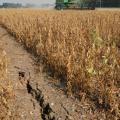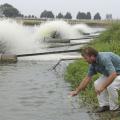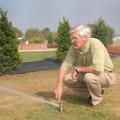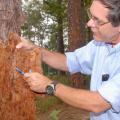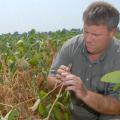Feature Story from 2006
MISSISSIPPI STATE -- Hurricane Katrina changed the way Mississippi crops leave the state, and a year later some producers are still dealing with the change.
Mississippi's port at Gulfport and the ports at New Orleans and Mobile served as the exit point for much of the state's crops. Katrina damaged each of these, wiping the Port of Gulfport clear of all its structures and temporarily closing the others. Nearly a year later, all are back in some level of operation, but Gulfport is still in the worst shape of the three.
MISSISSIPPI STATE -- A summer fund-raising event netted $120,000 to help grant outdoor wishes to young people facing life-threatening illnesses.
The Catch-A-Dream Foundation gives children 18 years old and younger a unique opportunity to distract their minds from the many physical pressures they face as they battle difficult medical circumstances.
MISSISSIPPI STATE -- Diners who come to sample some of the hundreds of dishes at the 16th annual rice luncheon in Cleveland also can take part in a tour of Mississippi rice fields to see where their meal began.
The meal will be served from 11 a.m. until 2 p.m. Sept. 15 at Delta State University’s Walter Sillers Coliseum.
Don Respess, Bolivar County director for Mississippi State University’s Extension Service, said the 2 p.m. tour is a new addition to the event that attracts more than 1,000 people each September marking National Rice Month.
MISSISSIPPI STATE -- An abundance of large shrimp should translate to a great year for Mississippi's industry, but high fuel costs and poor prices are making it hard for fishermen to justify the effort.
Dave Burrage, professor of marine resources with the Mississippi State University Extension Service in Biloxi, said the catch is running just a little above the same period last year. However, the harvest is still below the five-year average.
MISSISSIPPI STATE -- Ground that gets dry enough can shift and displace buildings, a fact building owners across the drought-ridden state are seeing as they deal with cracking foundations and split walls.
Larry Oldham, soil specialist with the Mississippi State University Extension Service, said the clay content of soils is the driving force for this movement.
By Robert H. Wells
Delta Research and Extension Center
STONEVILLE -- Rain came for Mississippi's row crops in 2006; it just did not come when producers needed it most.
“The key is timing,” said Bart Freeland, a physical scientist for the U.S. Department of Agriculture's weather facility in Stoneville.
“We got a lot of rain early in the season, but when it came time for filling pods and bolls in June and July, many producers didn't get the precipitation they needed,” Freeland said.
By Chance McDavid
MISSISSIPPI STATE -- Decreased water and oxygen levels in Mississippi's drought-damaged ponds could lead to trouble for cattle and fish.
Muddy pond bottoms that occur when water levels fall can cause problems for cattle. Roy Higdon, area livestock agent with Mississippi State University's Extension Service, said cattle sometimes get stuck in the mud while looking for water to drink.
“When cattle get stuck, it is sometimes a challenge to get them out. It's a good idea to try and dig them out first,” he said.
MISSISSIPPI STATE -- The fact that they live in the water has not spared Mississippi's catfish from feeling the effects of the summer's drought and high temperatures.
Catfish ponds in east Mississippi average 6 feet deep and are filled by rainfall and runoff. Ponds in the Mississippi Delta average less than 5 feet deep and have pumps to keep them filled with groundwater.
Charlie Hogue, catfish production specialist with the Mississippi State University Extension Service, said this summer's drought means the ponds in east Mississippi are not being refilled.
MISSISSIPPI STATE -- Watering lawn plants and grass is essential during a drought, but how and when to water is the key to keeping yards healthy and attractive.
It is important to water with long-term effects in mind is important during a drought, said Mississippi State University Extension Service horticulturist Norman Winter.
MISSISSIPPI STATE -- Mississippi hunters will reap the benefits of well-managed wildlife areas and food plots following this summer's drought.
Bronson Strickland, assistant professor of wildlife with Mississippi State University's Extension Service, said nutritional stress caused by the drought is likely to impact fawn survival, adult body weight and antler development.
MISSISSIPPI STATE-- Take high temperatures, drought and forest fires, add the woody debris caused by Hurricane Katrina and the result is the recipe for South Mississippi's worst bark beetle outbreak in more than a decade.
MISSISSIPPI STATE -- Mississippi's row crops, catfish, timber and cattle are all feeling the impact of the 2006 drought and heat.
Bart Freeland, a physical scientist for the U.S. Department of Agriculture's weather facility in Stoneville, said many row crops need at least 20 inches of water, and some can use almost twice that amount in a growing season.
By Shoshana Brackett
MISSISSIPPI STATE -- Plants with naturally occurring medicinal compounds growing today in Mississippi could hold the keys to tomorrow's cures and become an important crop to state farmers.
Ganisher Abbasov, a Mississippi State University doctoral student in agronomy, has a project involving the study of American mayapple, lemongrass and basil. Abbasov is studying how nutrients, location and soil type affect plant productivity and medicinal compounds in those plants.
MISSISSIPPI STATE – A video conference on Sept. 26 will help participants learn the value of plants for improving indoor air quality.
The two-hour conference will begin at 10 a.m. in locations around the state. Contact county Extension Service offices for local availability.
Kerry Johnson, area horticulturist in George County with Mississippi State University’s Extension Service, said the concept for the conference started as a Master Gardener effort called the 4-H Fresh Air Project.
MISSISSIPPI STATE -- The summerlong drought has drastically reduced hay yields and quality, forcing many livestock producers to look for alternative forages and supplemental feeds and consider downsizing their herds.
John Anderson, agricultural economist with Mississippi State University's Extension Service, said the expanse of this drought, which is worse in the major cattle producing states of Texas and Oklahoma, will impact the cattle market and the previous national herd expansion.
MISSISSIPPI STATE -- Tourism industry professionals, economic developers and others interested in developing or expanding rural tourism in their communities should attend the sixth annual Alabama-Mississippi Rural Tourism Conference Sept. 18 and 19 in Tupelo.
Donald Anderson of Purdue University is a featured speaker. With more than 25 years of industry experience in hospitality operations and tourism marketing, Anderson has provided expert advice to more than 350 organizations.
MISSISSIPPI STATE -- Mississippi State University is receiving a national award for efforts to help re-establish vital communication links on the Mississippi Gulf Coast immediately following Hurricane Katrina.
MISSISSIPPI STATE -- Rice may set a state record average yield this year and be the bright spot across Mississippi's drought-stricken farmland if early harvest rates continue.
Nathan Buehring, rice specialist with the Mississippi State University Extension Service, said harvest started at the end of August and early yields are promising.
MISSISSIPPI STATE -- Rising fuel prices have more than doubled the cost of keeping vehicles on the road in the last few years, and efforts to curb costs have turned many consumers and fleet operators to an alternative that is also environmentally friendly.
Biodiesel made from soybeans is selling and performing well across the state, making biodiesel a high-demand fuel for some drivers. While its price at the pump once surpassed petroleum-based diesel, its use can now save money for drivers.
MISSISSIPPI STATE -- Most Americans depend on gasoline-powered vehicles for their personal travel, but when it comes to mass transit and freight, diesel power moves the nation.
Anyone who has sat in traffic behind a diesel-fueled bus or big truck knows the fumes can be unpleasant. Burning petroleum diesel also produces harmful emissions, according to Mississippi State University biological engineer San Fernando.
Pages
Feature Story Archive
- 2025 (43)
- 2024 (116)
- 2023 (114)
- 2022 (112)
- 2021 (104)
- 2020 (140)
- 2019 (126)
- 2018 (141)
- 2017 (197)
- 2016 (240)
- 2015 (319)
- 2014 (355)
- 2013 (371)
- 2012 (343)
- 2011 (246)
- 2010 (236)
- 2009 (229)
- 2008 (188)
- 2007 (210)
- 2006 (199)
- 2005 (224)
- 2004 (215)
- 2003 (228)
- 2002 (176)
- 2001 (184)
- 2000 (188)
- 1999 (180)
- 1998 (178)
- 1997 (188)
- 1996 (58)
- 1995 (36)


